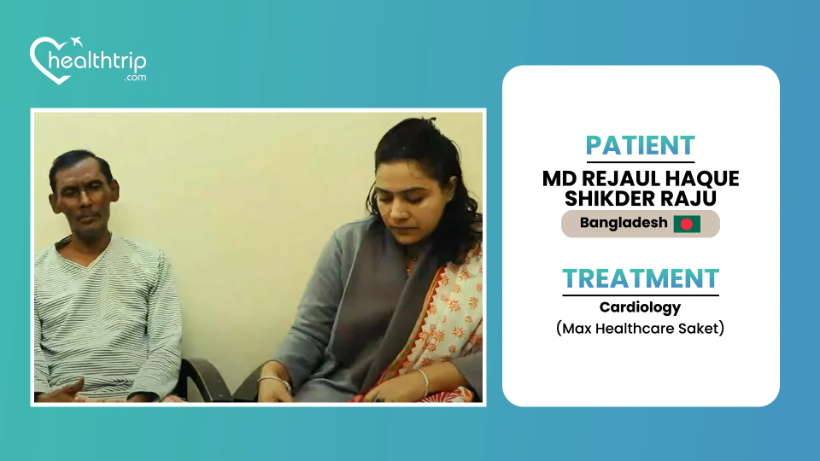Max Healthcare Saket
New Delhi, saket, India
Max Super Speciality Hospital is one of the topmost multi-specialty hospital in capital city Delhi. The hospital is having more than 500+ bedded facility offers treatment across all medical disciplines. Expert doctors of Max Hospital... read more
Send EnquiryAbout The Hospital
- Max Super Speciality Hospital is one of the topmost multi-specialty hospital in capital city Delhi.
- The hospital is having more than 500+ bedded facility offers treatment across all medical disciplines.
- Expert doctors of Max Hospital have treated more than 34+ lakh patients across all major specialties.
- This hospital is equipped with state-of-art 1.5 Tesla MRI machine and a 64 Slice CT Angio.
- It also has Asia's first Brain SUITE- an advanced Neurosurgical operation theatre, which allows MRI to be taken while surgery.
- Hospital also won a prestigious award by the Association of Healthcare Providers of India (AHPI)
- FICCI awarded Max Super Specialty Hospital, Saket with the Award for Operational in Healthcare Delivery on 7 September 2010.
Key Highlights
- A Specialised Dialysis Unit Conforms with international standards.
- Haemodialysis for patients with end-stage kidney disease/requiring renal replacement therapy
Specialty Clinics
- Women's Heart Clinic
- Multiple Sclerosis (M.S.) Clinic
- Headache Clinic
- Geriatric Neurology Clinic
- Movement Disorder Clinic
- Pacemaker Clinic
- Arrhythmia & Electrophysiology Clinic
Treatments Offered
Top Doctors
Chairman – Liver & Biliary Sciences
CONSULTS AT EXPEREIENCE :35 years SURGERIES :
5000+
Treatment Starting at $6,000
Free Text ConsultTreatment Starting at $6,000
35 years SURGERIES :
5000+ TREATMENT COST
Starting at $6,000
Treatment Starting at $1,100
Free Text ConsultTreatment Starting at $1,100
25 years SURGERIES :
5000+ TREATMENT COST
Starting at $1,100
Chairman & Chief Surgeon - Orthopaedics & Joint Replacement
CONSULTS AT EXPEREIENCE :30 years SURGERIES :
15000+
Treatment Price on request
Free Text ConsultTreatment Price on request
30 years SURGERIES :
15000+ TREATMENT COST
Treatment Price on request
Treatment Starting at $4,250
Free Text ConsultTreatment Starting at $4,250
10+ years SURGERIES :
6000+ TREATMENT COST
Starting at $4,250
Treatment Price on request
Free Text ConsultTreatment Price on request
40 years SURGERIES :
NA TREATMENT COST
Treatment Price on request
Principal Director & Head At Max Super Speciality Hospital And Smart Max Hospital, Saket
CONSULTS AT EXPEREIENCE :28 years SURGERIES :
NA
Treatment Price on request
Free Text ConsultTreatment Price on request
Principal Director & Head At Max Super Speciality Hospital And Smart Max Hospital, Saket
CONSULTS AT28 years SURGERIES :
NA TREATMENT COST
Treatment Price on request
Patient Testimonials

Patient Samarzit Saha
Age -
Patient Samarzit Saha came for his treatment at Max Saket hospital and... Read More

Md Rejaul Haque Shikder Raju
Age - 47 Years
Md Rejaul Haque Shikder Raju is from Bangladesh has undergone a succes... Read More

Shahadat Hossain Badshah
Age - 58 Years
I am Shahadat Hossain Badshah from Bangladesh. I wanted to get a cons... Read More
Nearby Guest House
Team & specialisation
Infrastructure

Number Of Beds
530

Operation Theatres
12

No Of Surgeon
41
Blogs

Hair Treatment Cost in India
Hair is often considered a symbol of beauty and vitality, making hair loss or other hair-related concerns a significant issue for many individuals. The desire to address hair problems has led to the growth of the hair treatment industry in India. However, it's essential to understand the costs associated with various hair treatments before embarking on any procedure. In this blog, we will explore the factors affecting the cost of hair treatments in India and give an overview of the common types of treatments available.Factors Influencing Hair Treatment CostsSeveral factors influence the cost of hair treatments in India:1. Type of Treatment:Different hair treatments target various concerns, such as hair loss, dandruff, or damage. The type and complexity of the treatment will significantly affect the cost.2. Clinic Location:The cost of living and operating a business varies across different cities and regions in India. Therefore, the location of the clinic can influence the overall treatment cost.3. Clinic Reputation:Established and reputable clinics with experienced doctors or specialists may charge higher prices due to their expertise and credibility in providing successful treatments.4. Technology and Equipment:Advanced technology and modern equipment used during the treatment can increase the cost. Cutting-edge techniques often deliver better results, justifying the higher price.5. Extent of the Problem:The severity of the hair issue and the amount of treatment required will affect the overall cost. More extensive problems may necessitate more sessions and products, resulting in higher expenses.6. Post-Treatment Care:Some treatments require post-treatment care, which could include medications, follow-up visits, or special hair care products. These additional costs should be considered in the overall budget.Common Hair Treatment Options and Their Costs1. Hair Transplant:Hair transplant is a popular treatment for hair loss. It involves extracting hair follicles from one part of the body (usually the back of the scalp) and implanting them into the balding areas. The cost varies based on the number of grafts needed and the clinic's location. On average, the cost ranges fromCost: $350 to $1,400 2. PRP Therapy (Platelet-Rich Plasma):PRP therapy involves injecting a concentration of a patient's platelets into the scalp to stimulate hair growth. The cost per session typically ranges from Cost per session: $35 to $115 Average cost per session: $65 3. Hair Spa and Conditioning:Hair spas and conditioning treatments help improve the health and appearance of the hair. The cost varies based on the type of treatment and the salon or clinic, ranging from Cost: $115 to $550Average cost: $3004. Hair Rejuvenation Treatments:These treatments aim to revitalize hair follicles and promote hair growth using various techniques. Costs can range from Cost per session: $55 to $225Average cost per session: $135 depending on the procedure and clinic.5. Laser Hair Therapy:Laser therapy is used to stimulate hair growth and improve hair thickness. The cost can range from Cost per session: $35 to $135Average cost per session: $75 ConclusionUnderstanding the cost of hair treatments in India is crucial for individuals seeking to address their hair concerns effectively. It's essential to research different clinics, consider the factors influencing the cost, and consult with professionals to determine the best treatment plan that aligns with both the desired outcomes and budget. Remember, investing in your hair's health and appearance can significantly impact your overall confidence and well-being.

Comprehensive Guide to Varicose Veins Treatment: Top Doctors, Costs & Procedures
IntroductionVaricose veins are a common vascular condition that affects millions of people worldwide. These swollen, twisted veins not only cause discomfort but can also lead to serious health issues if left untreated. Fortunately, there are numerous treatment options available to alleviate the symptoms and improve the appearance of varicose veins. In this comprehensive guide, we will explore the top doctors, costs, and procedures associated with varicose vein treatment.Understanding Varicose VeinsBefore delving into treatment options, it's essential to have a basic understanding of varicose veins. Varicose veins occur when the one-way valves in the veins of the legs weaken or fail, causing blood to pool in the veins. This leads to the characteristic appearance of swollen, bulging veins that are often blue or purple in color. Common symptoms of varicose veins include pain, heaviness, fatigue, itching, and swelling in the affected areas.When to Seek TreatmentVaricose veins are not only a cosmetic concern but can also result in health complications such as ulcers, blood clots, or skin changes if left untreated. If you experience any of the following symptoms, it's advisable to consult a healthcare professional for an evaluation:Persistent pain or discomfort in your legs.Swelling, redness, or inflammation around the varicose veins.Skin changes or ulcers near the affected veins.Bleeding from the varicose veins.Top Doctors for Varicose Vein TreatmentChoosing the right healthcare provider is crucial for receiving effective varicose vein treatment. Here are some top specialists you can consider:Dr. Vaibhav MishraAdditional Director & Head - Cardiothoracic And Vascular SurgeryConsults at : Max Super Speciality Hospital, PatparganjFortis Hospital, NoidaDr. Vaibhav Mishra is an expert doctor in Total Arterial Bypass using B/L IMAS and MInimally Invasive Cardiac Surgery and does entire spectrum of Adult Cardiothoracic & Vascular Surgery with ease and grace.Dr Mishra committed to excellence in patient care, basic & clinical research on disease affecting patients.His primary goal is to provide his patients with customized best treatment options available in surgical care.This kind of personalized care is what differentiates Dr. Vaibhav Mishra from the rest.Dr. Suhail Naseem BukhariDirector - Vascular & Endovascular DepartmentConsults at : Fortis Escorts Heart Institute BLK-Max Super Speciality Hospital, New DelhiDr. Suhail Naseem Bukhari is a caring, skilled professional, dedicated to simplifying what is often a very complicated and confusing area of health care.Dr. Suhail Naseem Bukhari works as a Visiting Consultant in the Vascular Surgery department. Dr. Bukhari has over 20 years of experience as a surgeon.In India, Dr. Suhail Naseem Bukhari is well-known as a vascular and endovascular surgeon. He has received widespread praise for his adaptability and patient-centered philosophy.Dr Kumud RaiDirector - Vascular SurgeryConsults at : Max Healthcare SaketDr.(Col) Kumud Rai is an experienced Vascular and Endovascular surgeon.He was the President of Vascular Society of India and several Vascular Surgeons are trained under his supervision.Areas Of InterestAortic aneurysm repair – Open & EVAR.Peripheral Bypass Surgery – open & stent.Varicose Veins – Laser, RFA, Surgery.Dialysis access procedures – fistula, grafts.Carotid endarterectomy.Carotid body & other vascular tumors/malformations.Dr R JayakrishnanConsultant - Vascular SurgeonConsults at : MGM Hospital, ChennaiDedicated Vascular Surgeon with indepth knowledge and experience in managing vascular surgical patients. Trained and worked in reputed institutions with experience in working under NHS , UK. Proactive and professionally committed to achieve the best possible outcome for each and every patient.FIELD OF INTEREST:DIABETIC FOOT MANAGEMENTTo prevent Diabetic foot ulcers and facilitate early healing of formed ulcers , prevent Amputations in Diabetic Foot Disease patients by open vascular and endovascular interventions.STROKE PREVENTION -To increase the awareness of stroke prevention and prevent further episodes of stroke in at risk patients by carotid endarterectomy, carotid stenting.HAEMODIALYSIS ACCESS CREATION , SALVAGE -To create AV Access and salvage / aid maturation by open endovascular interventions.VARICOSE VEIN MANAGEMENT -Painless , scarless method of management of Varicose Veins under Local Anaesthesia and as daycare procedure by endovenous ablation, non thermal techniquesCosts of Varicose Vein TreatmentThe cost of varicose vein treatment can vary widely depending on several factors, including the severity of the condition, the chosen treatment method, the geographic location, and your insurance coverage. Here's a breakdown of common treatment options and their approximate costs:Sclerotherapy: This minimally invasive procedure involves injecting a solution into the varicose vein to close it off. Costs can range from $200 to $600 per session, and multiple sessions may be required.Endovenous Laser Therapy (EVLT): This laser-based treatment typically costs between $1,500 and $3,000 per leg.Radiofrequency Ablation (RFA): RFA procedures can cost anywhere from $1,500 to $3,000 per leg.Surgical Vein Stripping: Traditional surgical treatment may cost between $1,500 and $3,000 per leg.Insurance Coverage: Many health insurance plans may cover varicose vein treatment if it is deemed medically necessary. Be sure to check with your insurance provider for specific coverage details.Choosing the Right ProcedureThe choice of varicose vein treatment depends on various factors, including the size and location of the veins, your overall health, and your preferences. Consult with a qualified specialist who can recommend the most suitable option for your condition. Minimally invasive procedures like EVLT and RFA are becoming increasingly popular due to their effectiveness, shorter recovery times, and minimal scarring.ConclusionVaricose veins can be both a cosmetic concern and a potential health risk, but there are numerous treatment options available to alleviate symptoms and improve your quality of life. Consulting with experienced healthcare providers, understanding the costs involved, and selecting the right treatment method are essential steps toward managing varicose veins effectively. Don't hesitate to seek medical advice if you're experiencing symptoms or have concerns about your varicose veins; timely intervention can make a significant difference in your overall well-being.

Diabetes Treatment Cost in India
IntroductionDiabetes is a chronic medical condition that affects millions of people worldwide, and India is no exception. With a growing population and lifestyle changes, the prevalence of diabetes in India has been on the rise. One of the significant concerns for individuals and families dealing with diabetes is the cost of treatment. In this blog, we'll delve into the various aspects of diabetes treatment costs in India, including medications, diagnostics, and lifestyle management.The Prevalence of Diabetes in IndiaBefore we explore the costs, let's understand the scale of the diabetes problem in India. According to the International Diabetes Federation (IDF), India had approximately 77 million adults with diabetes in 2019, and this number is expected to rise to over 100 million by 2030. The burden of diabetes in India is substantial, affecting individuals and families both physically and financially.Medication CostsMedications are a crucial part of diabetes management, and their costs can vary depending on the type of diabetes and treatment plan. Here are some common types of diabetes medications and their approximate costs in India:a. Oral Medications: Many people with type 2 diabetes initially manage their condition with oral medications like Metformin, Gliclazide, and Glimepiride. These drugs are relatively affordable, with monthly costs ranging from$0.60 to $3.60b. Insulin: Individuals with type 1 diabetes and some with type 2 diabetes require insulin therapy. Insulin costs can vary significantly depending on the type (e.g., rapid-acting, long-acting) and brand. On average, monthly insulin expenses can range from 12 USD TO 60 USDc. Glucose Monitoring: Regular blood glucose monitoring is essential for diabetes management. Glucometers and test strips can cost anywhere from $6.0 to $36.0Diagnostic CostsDiagnosing and monitoring diabetes involves various tests and check-ups. Here are some of the common diagnostic costs associated with diabetes:a. HbA1c Test: This test provides an average blood sugar level over the past 2-3 months and costs approximately $3.6 to $12.0b. Fasting and Postprandial Blood Sugar Tests: These tests are commonly done to monitor daily blood sugar levels and cost around$1.2 to $4.8c. Regular Doctor Consultations: Consultation fees for endocrinologists or diabetologists can vary, typically ranging from$6.0 to $24.0 or more per visit.Lifestyle Management CostsManaging diabetes effectively often requires lifestyle changes, including dietary modifications, exercise, and regular health check-ups. Here are some associated costs:a. Diet and Nutrition: Diabetes-friendly diets may require purchasing specific foods and supplements, which can increase monthly grocery expenses by I$6.0 to $24.0 or more.b. Physical Activity: Engaging in regular physical activity, such as gym memberships or fitness equipment, can cost around$12.0 to $36.0 per month.

Epilepsy Treatment Cost in India
Epilepsy treatment costs in India can vary widely depending on several factors such as the type of treatment required, the severity of the condition, the choice of hospital or clinic, and the location within India. Here's a breakdown of potential expenses associated with epilepsy treatment in IndiaMedical Consultations and Diagnostic Tests:Initial Consultation: This includes the first visit to a neurologist for diagnosis and evaluation. The cost can range from $5 to $24 USD or more, depending on the doctor's expertise and the location of the clinic/hospital.Follow-up Consultations: These may be required for monitoring the condition, adjusting medication dosages, or addressing any concerns. Each follow-up consultation can cost between $3 to $18 USD.Diagnostic Tests: This can include EEG (Electroencephalogram), MRI (Magnetic Resonance Imaging), and other tests to confirm the diagnosis and monitor brain activity. These tests can range from $12 to $120 USD or more depending on the type and location.Medications:Anti-Epileptic Drugs (AEDs): These are usually the first line of treatment for epilepsy. The cost of AEDs can vary significantly based on the type of medication, dosage, and whether they are generic or brand-name. Monthly expenses for AEDs can range from ?500 to ?5,000 or more.Hospitalization and Inpatient Care:In cases of severe seizures or complications, hospitalization may be required. The cost of hospitalization, including room charges, nursing care, and other services, can vary widely from $60 to $290 USD Per day or more.Surgery and Procedures cost :In some cases, surgery or other interventional procedures may be recommended. The cost of these procedures can be quite high, ranging from $1200 USD to several lakhs or more, depending on the complexity and duration of the procedure.Therapies and Rehabilitation cost :Occupational therapy, speech therapy, and physical therapy may be recommended as part of the treatment plan. The cost of these therapies can vary, with sessions ranging from $5 to $24 USD or more.Here are some specific examples of the cost of epilepsy treatment at these hospitals:Max Hospital, Saket:Cost of a consultation with a neurologist: (USD 15 to USD 30)Cost of a day of hospitalization for epilepsy monitoring: (USD 750 to USD 1500)Cost of epilepsy surgery:(USD 3,000 to USD 7,500)Fortis Memorial Research Institute:Cost of a consultation with a neurologist: (USD 22 to USD 37)Cost of a day of hospitalization for epilepsy monitoring: (USD 900 to USD 1800)Cost of epilepsy surgery: (USD 3,750 to USD 9,000)Apollo Hospitals:Cost of a consultation with a neurologist: (USD 18 to USD 30)Cost of a day of hospitalization for epilepsy monitoring: (USD 750 to USD 1500)Cost of epilepsy surgery: (USD 3,000 to USD 7,500)How can we help with the treatment?If you're on the lookout for treatment in India, Thailand, Singapore, Malaysia, UAE, and Turkey, let Healthtrip be your compass. We will serve as your guide throughout your medical treatment. We'll be by your side, in person, even before your medical journey commences. The following will be provided to you:Connect with renowned doctors from a network spanning 35+ countries and access the world's largest health travel platform.Collaboration with 335+ top hospitals , including Fortis and Medanta.Comprehensive treatments from Neuro to Cardiac to Transplants, Aesthetics, and Wellness.Post-treatment care and assistance.Teleconsultations at $1/minute with leading surgeons.Trusted by 44,000+ patients for appointments, travel, visa, and forex assistance.Access top treatments and packages, such as Angiograms and many more.Gain insights from genuine patient experiences and testimonials.Stay updated with our medical blog.Our success storiesIt's important to note that these are approximate costs and can vary based on individual circumstances, location, and the specific treatment plan recommended by the healthcare provider. Additionally, government hospitals and charitable organizations may offer more affordable options for those with limited financial resources. It is advisable to consult with a healthcare provider and explore different options for managing epilepsy within one's budget.















